|
|
|
Sort Order |
|
|
|
Items / Page
|
|
|
|
|
|
|
| Srl | Item |
| 1 |
ID:
133795
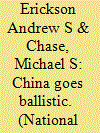

|
|
|
|
|
| Publication |
2014.
|
| Summary/Abstract |
China's growing missile and nuclear forces will pose a complex, challenging threat to America and its allies.
CHINA IS INCREASINGLY A FORCE TO BE RECKONED WITH, not only economically but also militarily. Its aggressive stance toward some of its neighbors, along with Asia's growing economic importance and the need to assure U.S. allies that Washington will increase its attention to the region despite budgetary challenges and fractious domestic politics, prompted the Obama administration to announce a "rebalance" toward Asia.
|
|
|
|
|
|
|
|
|
|
|
|
|
|
|
|
| 2 |
ID:
143634
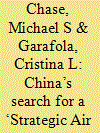

|
|
|
|
|
| Summary/Abstract |
Once dismissed by many outside observers, the Chinese People’s Liberation Army Air Force (PLAAF) has undergone an impressive transformation over the past two decades, emerging as one of the world’s premier air forces. As it continues to modernize, it is focused on becoming a ‘strategic air force.’ PLAAF strategists suggest this means it should play a decisive role in protecting Chinese national interests, field modern capabilities commensurate with China’s standing as a major power, and enjoy the institutional status befitting its role as a ‘strategic service,’ an important consideration given the historical dominance of the ground force in China’s military.
|
|
|
|
|
|
|
|
|
|
|
|
|
|
|
|
| 3 |
ID:
145763
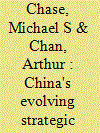

|
|
|
|
|
| Summary/Abstract |
Strategists often think of strategic deterrence as synonymous with nuclear deterrence, the top of the escalation ladder; China does not. In fact, China's strategic deterrence concepts are evolving and expanding, along with strides in strategic weapons capabilities, reflecting Beijing's increasing concerns about external security threats and a growing emphasis on protecting Chinese interests in space and cyberspace.
|
|
|
|
|
|
|
|
|
|
|
|
|
|
|
|
| 4 |
ID:
160693


|
|
|
|
|
| Summary/Abstract |
Chinese analysts view the US military not only as a model for emulation but also as a serious threat given its strengths in high tech weapons and equipment, power projection, and unparalleled ability to conduct information-intensive joint combat operations. Yet they also see many of the capabilities the US military relies upon to execute these operations – most notably forward bases, space capabilities, and computer networks and information technology systems – as potentially vulnerable to disruption. Accordingly, China has developed capabilities designed to deter or counter US military intervention in areas close to China. This poses two interrelated challenges for the United States: maintaining its military advantage in an era of rapid technological change and preserving deterrence against growing Chinese ambitions in Asia.
|
|
|
|
|
|
|
|
|
|
|
|
|
|
|
|
| 5 |
ID:
086249
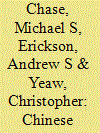

|
|
|
|
|
| Publication |
2009.
|
| Summary/Abstract |
The People's Republic of China (PRC), no longer content with its longstanding 'minimalist' nuclear posture and strategy, is enhancing the striking power and survivability of its theater and strategic missile forces and rethinking its nuclear doctrine in ways that may pose serious challenges for the United States. Although the modernization of Chinese nuclear and missile forces may ultimately result in greater strategic deterrence stability, this change will not come about immediately or automatically. Indeed, it is entirely possible that China's growing missile capabilities could decrease crisis stability under certain circumstances, especially in the event of a US-China conflict over Taiwan.
|
|
|
|
|
|
|
|
|
|
|
|
|
|
|
|
| 6 |
ID:
114746
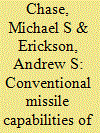

|
|
|
|
|
| Publication |
2012.
|
| Summary/Abstract |
Since its establishment in the early 1990s, the conventional missile component of the People's Liberation Army's Second Artillery Force (SAF) has emerged as a centerpiece of China's accelerating military modernization program. The conventional missile force has grown in size and sophistication, and China has developed a doctrine for its employment. Chinese military publications emphasize that it plays an increasingly important role in deterrence and warfighting. In particular, Chinese sources underscore its role in achieving information dominance, air superiority, and sea control as well as countering third-party intervention. China's development of advanced conventional missile capabilities highlights the growing vulnerability of fixed bases and surface ships. Moreover, organizational tendencies, could fuel dangerous escalation. In response to these challenges, the United States must adapt its traditional approach to military operations and deterrence in the Asia-Pacific.
|
|
|
|
|
|
|
|
|
|
|
|
|
|
|
|
| 7 |
ID:
064649
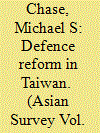

|
|
|
|
|
| Publication |
May-Jun 2005.
|
|
|
|
|
|
|
|
|
|
|
|
|
|
|
|
| 8 |
ID:
083654
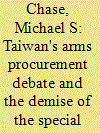

|
|
|
|
|
| Publication |
2008.
|
| Summary/Abstract |
Despite the growing security threat posed by Chinese military modernization, Taiwan still has not completed the purchase of some of the key components of the arms sales package the United States approved in April 2001. The reasons include overconfidence in U.S. security assurances, underestimation of Chinese capabilities and resolve, and highly divisive domestic Taiwanese politics
|
|
|
|
|
|
|
|
|
|
|
|
|
|
|
|
|
|
|
|
|